Our Own Best Judges
Young Female Characters On Stage
Recently, I was reviewing the show Age of Beauty, written and directed by Stuart Bousel, at San Francisco’s Exit Theatre. The show is a series of conversations — there’s no blocking, and characters remain seated at a table throughout each scene — all between young women who were close as youngsters in Tucson. Watching it, I felt myself constantly asking if the characters adhered to certain standards whose fairness I now question: Does she talk about her ex-boyfriend too much, as if he’s the only thing worth talking about? Do her rejoinders sound laugh track ready? More generally: Is she complex? Authentic?
These are not unreasonable questions to ask, of course, but what we mean when we talk about complexity and authenticity in young female characters is shaped by the broader discussion about gender parity going on in American theater right now. That discussion tends to focus on the artists who create plays, asking questions about the percentage of produced plays that were written by women or the percentage of theater leaders who are women.
But inextricably tied to those questions, of course, is a question about the content of those plays: Do their female characters represent as wide a range of the human experience as their males? In a world in which we actually have to ask this question, to make your young female characters complex and authentic is not just important artistic practice; it’s important political practice.
What would happen if a conference could be planned as one long coffee break?
This makes me feel as if there is a lot at stake with each new female character whom I might evaluate as part of a review, that each one exists not in a vacuum but either furthers or hinders a broader political effort I care deeply about. Critics are supposed to be objective, to approach a work with no agenda, but in this case, I have one. Arguably this agenda is no different from wanting a work to be good; an authentic, complex female character (usually) serves art better than a hackneyed one does. It’s impossible to separate one’s politics from one’s aesthetics (aesthetics are never pure!), but sometimes I worry that my politics have too much control over my critical criteria. When I’m dissecting every line a young female character speaks (I focus on young women both because I identify with them and because they seem more vulnerable to stereotyping) for what it says about women in the American theater, am I being rigorous or ruthless?
When I’m dissecting every line a young female character speaks... am I being rigorous or ruthless?
The Fantasy Club by Rachel Bublitz, an All Terrain Theater production which I saw shortly after Age of Beauty, provoked similar questions for me. The play, about a stifled housewife, Frances (Siobhan Marie Doherty), her easygoing but overworked husband Max (Tavis Kammet), and her down-on-her-luck best friend Samantha (Claire Rice), is riddled with logical shortcuts. Frances is obsessed with physical safety, sans explanation, in order to justify what would otherwise have been a deus ex machina of an ending (a bullet proof vest is involved).
Additionally, Frances’s high school crush Jacob (Rob Dario) is still the object of her fantasy, which she details in erotic poems that she wants to publish, all despite the fact that she hasn’t seen him in at least a decade. Coincidentally, Samantha happens to run into him and bring him to dinner, and he happens to aggressively reciprocate Frances’s affections. More tastelessly, Jacob turns out to be a psychopath, and he subjects Frances and the audience to a slimy, drawn-out sex scene that’s rape by any definition but the most technical, but that also trivializes that ghastly crime. Finally, Frances doesn’t even bring up what’s really bothering her about her marriage, the play’s supposed mainspring—that doing all the family’s chores makes her feel like she’s her husband’s servant—until the last scene. After that revelation, all is magically resolved, as if readying the studio audience for their applause.
The directing, by Tracy Held Potter, is also lacking. One of the play’s themes is that everyone has weird sexual fantasies, often involving a desirer’s entire social group. If the fantasies themselves are a hoot (and they’d better be), Potter makes transitions into and out of them awkward, the colored lights dropping and the characters suddenly back to their non-fantastical selves without any directorial commentary on what just happened. If the whole play were of this tone, the play could be a delightfully campy romp; as interludes, they have no reason to exist other than to lend each scene a vague sexual charge.
Frances, what’s more, is an unlikable character. Throughout the play she is blithely unaffected by her loved ones even as they’re in pain, and in Doherty’s broad rendering, she’s a comic type: the slightly loopy, conniving housewife that dates back to I Love Lucy. Claire Rice played Samantha with much more nuance and naturalism; it was as if the two performers were in different productions. She made Samantha likable, but in the way that Miranda on Sex and the City was likable — she was wry and grumpy and self-deprecating and vulnerable and flawed, doing the kinds of things that “real women” do: hiding how smart and successful they are, eating cake out of the trash can. Samantha, too, has her pathetic moments, hitting on Jacob with too much forwardness, touching his arm at the wrong time, and when we know she doesn’t have a chance.
For a long time, I thought a good character in theater was simply one who has the capacity to surprise you, to challenge you, to make you think;
For a long time, I thought a good character in theater was simply one who has the capacity to surprise you, to challenge you, to make you think; who has compelling virtues and vices and who doesn’t reveal all her sides at once; who inspires you to dream your own scenarios for her and wonder how she’d act. All this is certainly a part of what makes a good character — but good television characters can also do these things.
Now I think that there’s a separate quality that distinguishes good theatrical characters, that there’s a reason that a character like Miranda or Samantha works well only on television. In that medium, we have a lot of time to get to know characters, and we take pleasure in seeing them do slightly different versions of the same thing over and over again. It’s familiar. It’s comforting. These characters almost never change, and when they do, they change extremely gradually. Characters in theater, by contrast, have to show us who they are very quickly and then change very quickly (relative to television, at least). They must change for the sake of making the play go somewhere and bringing it to a meaningful conclusion.
What Every Girl Should Know, now in its Bay Area debut at Impact Theatre under Tracy Ward’s direction, doesn’t succeed in every aspect, but it at least offers female characters who exceed the grasp of television. Lucy (Arisa Bega), Anne (Abigail Edber), Theresa (Carlye Pollack) and Joan (Elissa Beth Stebbins) are young women in a Catholic home for deviants during World War I. While they are faithful Catholics, in their own way — covering the eyes of pictures of saints when they decide to misbehave, sniffing out potential Protestants (demon spies in their ranks!) like bloodhounds — they pray most ardently to saints of their own making: their own bodily pleasure and Margaret Sanger.
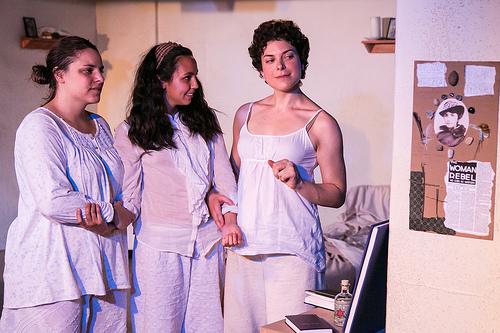
(from left) Elissa Beth Stebbins, Pollack and Bega.
Photos by Cheshire Isaacs
At rise we hear in darkness the creak and squeak of old bed frames and mattress springs—the telltale signs of secret late-night pleasures. Lucy, Anne and Theresa keep track of their masturbating records in a log book; when they roughhouse, they grab each other’s boobs and butts. This image of women—in their pajamas, playing with one another—is so often presented as the dirty slumber party of male fantasy, but this work, by playwright Monica Byrne, reclaims that kind of play as born of the kind of intimacy that’s not restricted by societal norms but that writes its own rules.
It’s easy to see how in a lesser playwright’s hands these four young women could have been boilerplate. Lucy is the prudish one whose terror of the devil is raw and who balks at any mention of the body parts she’s trying to pleasure. But if she’s limited by dogma, she’s wild and free in her storytelling imagination, the creative passion behind the writing of the group’s own religious myth. Anne is a kind of character women almost never get to play—rough and gruff and quick to anger, slow to immerse herself in the group’s prayers to their shrine to Sanger (their shrine to themselves), but with a sense of humor that’s just as wild as the stories Lucy tells. When she’s dared to steal a book and bring it back to the group’s dorm, she doesn’t just reenter the room with it; she lunges in and pretends to give heaving, bloody birth to it.
Theresa could simply be the one who always thinks about sex—getting caught sitting on the face of a married man is what got her sent to this sterile place in the first place—but especially in Pollack’s thoughtful portrayal, Theresa takes deep, mischievous joy in a life that could easily be seen as small and sad. Her blazing eyes are always searching for the next joke or the next delight. And Joan, as the newbie and the prophet of the good word of Margaret Sanger, is at first joyless%

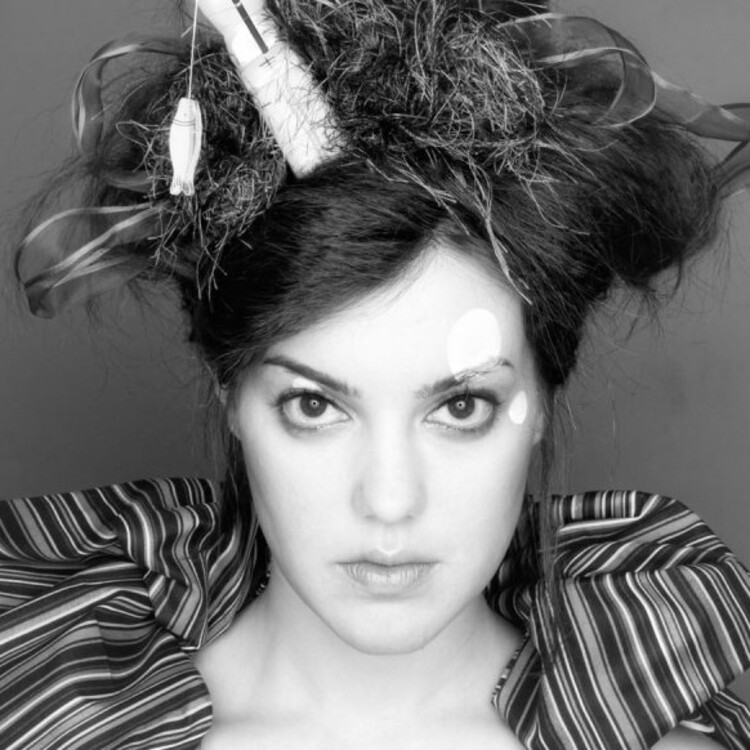
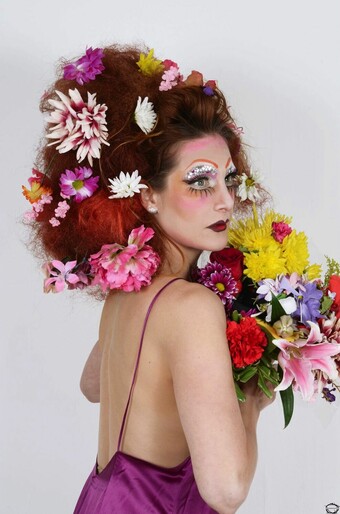

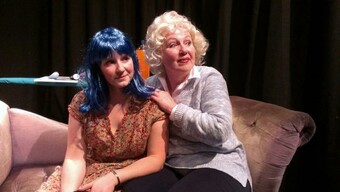

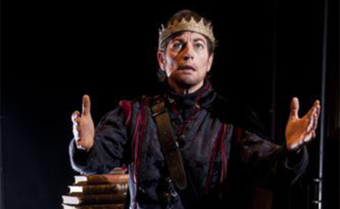

Comments
The article is just the start of the conversation—we want to know what you think about this subject, too! HowlRound is a space for knowledge-sharing, and we welcome spirited, thoughtful, and on-topic dialogue. Find our full comments policy here
yet another take on this piece from another artist mentioned herein. (his facebook said it was okay to share!)
http://sftheaterpub.wordpre...
I am deeply grateful to Lily Janiak for both attending The Fantasy Club and for writing a review on this piece. It's difficult for independent theater companies to get reviewed at all, and to have a piece in HowlRound is extremely exciting.
I am also deeply concerned about gender parity and the creation of strong female characters in theater and elsewhere. When the playwright of The Fantasy Club, Rachel Bublitz, and I discussed this play before production, we did ask ourselves questions about the female characters and whether we could stand behind what they represented. Ultimately, we thought we could and did.
First, the protagonist Frances is a stay-at-home-mom, which is a marginalized group of women in our society. We felt that sharing a story about an SAHM with a three-dimensional sexual life was something that as SAHM's ourselves, we could stand behind. We were telling the story of an under-served community of women and I was very proud of doing that.
Second, Frances is the agent of her own story. At one point, she is faced with a decision that only she can make about whether she should stay true to her marriage or pursue her fantasy and betray her husband. In many stories, even in more widely produced and respected plays, the female characters, even the protagonists, are the victims of their circumstances, and this is not the case. Frances made her own bed and laid in it (literally and figeratively).
Third, the play passes the Bechdel test, because both Samantha and Frances do have conversation with each other about something other than men (their careers).
Also, I would like to mention that while I think that Ms. Janiak has a right to view any play she sees with whatever lens she wishes to use, the play is fundamentally a comedy and the situations are extreme and bizarre and the characters are not meant to be deep representations of anything. We touch on the issues that are important to us as artists in theater, but our primary goal was producing an entertaining show, and that meant that Frances was a frazzled, oversexed housewife who lusted after a high school flame that she hadn't seen in ten years. Inspiring? Maybe not. But relatable? I think so.
I'm really puzzled about the reference to rape, because none of the fantasies were written to suggest rape and I don't think they were portrayed that way, either. I know that everything is up for interpretation, but this comment was really surprising.
All in all, I think the element of the gender parity question that I want to bring up from all of this is the question of when context matters when we discuss what makes a female character a "strong" character. Does she have to be likable? Does she have to win? Can a play be pro-women and still be mostly about women trying to have sex with men (or other women)?
I think we're in a stage of the gender parity movement where we need to have powerful and clear examples of plays that we as a community can point to and say, "Hey, this is what a strong female character looks like, and how come we don't see the likes of her more often?" But I think that we also need to embrace the fact that women are multi-dimensional human beings who have flaws and can be irritating or uninspiring.
I think the reason that so many feminists in theater are pushing so hard on theater companies that don't produce a season with 50/50 demographic balances between female and male directors and playwrights, and why a play like The Fantasy Club, which I consider to feature a strongish female protagonist, is falling on the side of "not good enough" in this movement is that we have so few women playwrights, directors, and characters to fill these roles that the ones who are present have to represent 50% of the human population. I think this is understandable, but is it fair?
My solution, of course, is to keep producing more work by, for, and about women, and then we can truly represent the female half of the population.
I would like to add that All Terrain Theater (which produced The Fantasy Club) produces an annual showcase of female solo performance. In the first year, we featured four solo artists and storytellers sharing stories ranging from pregnancy to dealing with cancer to aging and to being African American in the South. This year, our showcase featured seven stories around the Cat Ladies theme (which surprisingly didn't feature a single "crazy cat lady"). The 2014 showcase will be held in Berkeley, CA in May and will be directed by Siobhan Marie Doherty (theme TBA), and I encourage people who are interested in great theater that also clearly supports gender parity to check it out. http://www.allterraintheate...
Tracy,
Thank you for these excellent comments. As you say, just
as it’s rare for small theaters to get a critic to come to their shows, so is
it rare for critics to have artists engage with our writing in a deep but still
courteous way. Thank you for that. I’d like to address a few of the points you
brought up.
First, on presenting a sexualized stay-at-home mom: I
actually was intrigued by the character of a SAHM who wrote erotic
poetry. I think you’re right that this is precisely the kind of sexuality SAHMs
usually aren’t allowed to have. However, I think that that comprised a very
small section of how Frances was presented in the play; most of the play
sexualized her in a way that SAHMs are often sexualized: as having affairs
because they’re frustrated at home. While this is fine material for a drama, it
certainly doesn’t feel revolutionary. I would have loved to have seen more of
Frances actually in the act of writing poems.
Second, you stress that “The Fantasy Club” is ridiculous and
entertaining, and, I hope I’m not misinterpreting you here, you seem to be
suggesting that, as a result, I shouldn’t dig into it too intellectually. I
strongly disagree with you here. I think that there’s just as much to be
gleaned about our theater and our world from comedy as from drama. Asking
questions about why one thing makes us laugh and another doesn’t, the playwright’s
intention in that, and what that says about us is fundamental to a serious act
of criticism. This ain’t to say that I don’t love me a good time—one of my
favorite Bay Area theater companies is the Thrillpeddlers, precisely because
they’re so outlandish. This is where I think different directing choices in “The
Fantasy Club” could have made a difference. The acting, which could have been
fine in another play, was too realistic, the scenes often too low-key.
Third, as for the rape scene, you’re absolutely right that I
should have explained what I meant more. The scene in which Jacob finally has
sex with Frances felt like rape because she so clearly didn’t want to do it.
Even though she agreed to it, she was so visibly repulsed and pushed into it by
him, and the scene was so drawn out, seemingly to torture her, that I felt like
I was watching the kind of rape that’s insidious, too common, and too often
goes unpunished: when the victim actually knows the rapist. That the production
neither staged this moment in a highly stylized, outrageous way, nor treated it
as a serious incident, made it all the more painful for me to watch. For me it
was like that scene in Fast Times at
Ridgemont High when Jennifer Jason Leigh’s character gets an abortion and
no one seems to think it’s a big deal. The fact that it’s not commented on as a
big deal really tells us something.
Fourth, you’re also right that I should’ve explained why I
brought up Frances’s unlikability, or, as you say, “flaws.” You’re absolutely
right that we live in an age when women should be able to have as many vices as
virtues, but that’s just it: I felt that Frances’s flaws were so big that I
couldn’t see why her friend would care about her so much, for example.
Thanks again for commenting on my work. As long as my
article was, it probably should’ve been a little longer. I’m looking forward to
seeing more of your shows. In the meantime, let’s keep the conversation going.
Thanks, Lily, it's helpful to have additional information about your experience.
Regarding Frances' sexuality as an SAHM, I think we're now veering into personal preference and experience, because I feel that I haven't seen stories of SAHM's featured much at all, and I can't recall another play that I've seen or read that portrays a character like Frances in theater ... maybe in television, but even then she would not have been a protagonist.
And I agree that just because a show is a comedy doesn't mean that it doesn't have a significant link to politics and social concerns, particularly gender politics. What I meant to say was that the characters aren't developed in the same way in a comedy as in a drama. In my own writing, I strive to make my stories as engaging and entertaining (and often funny) as possible while still sneaking in some kind of message. In this piece, the goal wasn't so much to have a message as it was to have a good time and to produce a fun and funny piece by a new writer. As I wrote, I thought that we did a decent job of representing women. I would not say that this is the poster child for gender parity, but I consider All Terrain Theater to be a pro-woman theater company and I felt this play fell very comfortably in that realm.
Regarding the scene where Frances and Jacob have sex, I think I just failed to communicate what was happening through the play. Without trying to spoil the play, the bottom line is that Frances' discomfort with Jacob in that scene is not that she's pressured to sleep with him but he's not living up to her fantasy of what that experience will be like. She naturally has conflicting feelings about whether to sleep with him or not, but I don't think his actions were considered rape by the vast majority of people who saw the play, and it was certainly not something that anyone involved with the play intended to suggest. In fact, if there was a hint of rape in a play produced by All Terrain Theater, I would demand that it be addressed within the play. As it is, the joke was the contrast between the amazing fantasy and the disappointing reality. I'm sorry that didn't come across.
And thanks for clarifying the fourth point. I think that's something to look at with the next production.
And, yes, I'm looking forward to meeting up again on this journey of creating and sharing theater. I think it's important to have conversations with people about these topics, particularly if we wish to promote the role of women in theater and in society at large. I think it's clear that both of us share the same desire to promote gender parity and to question our decisions so that we can make legitimate change.
Thanks again for attending the show and giving it so much thought and consideration, that's really all theater artists want.
Art succeeds when it entertains and when it provokes discussion. The
latter happens when we project wildly onto the work. After watching
Fantasy Club my companions and I stood in a parking garage for 20
minutes exploring what we appreciated about the play and why were unsatisfied. This was a good thing.
From our perspectives, we saw it as a first act. When a self-aware person follows a course of action and pushes personal boundaries he/she gains self-knowledge that will inform future behaviors. We wanted to see an updated Frances: one who knows she can go after what she wants, knows she can cheat, knows she can handle a violent showdown, and knows how she reacts to all of it. But we recognized that we were outlining a different play. So we agreed that we were happy to have laughed out loud and to have imagined possibilities. Success.
P.S. Sometimes the sex is just bad.
Thanks, Lisa, this is helpful to hear! (And yes, I agree with your P.S.)
I saw both of these productions too (Fantasy Club and What Every Girl Should Know) and enjoyed them both, but they were so utterly different in style and created by artists of such widely differing levels of experience that I would hesitate to compare them. On the other hand, I very much appreciate Lily Janiak's focus on the representation of young women on stage and completely agree that creating authentic, complex female characters is vital to theatre and to feminism. My fervent hope: to see so many female protagonists of all ages driving the action onstage that they will cease to be a cause for heightened scrutiny.
Great point, CSL, and thanks for reading and commenting. The two plays are extremely different in style, you're right, and I didn't mean for the piece to come off as comparing them; once I get some distance from this piece I'll take another look and see how I could have written it differently. But I do think that, even if pieces are different in style, tone, etc., you can still talk about them both in terms of how they are or aren't feminist.
Lily,
I deeply appreciate all the attention you are bringing to women's work in the Bay Area. Your posts generate controversy because you ask the important questions. Keep asking them! I hope a lot more people join the conversation.
And I hope you'll come to the Exit with critical questions in tow on Wednesday, November 13 at 8 pm for a night of eight short plays about Trojan Women (part of the San Francisco Olympians Festival, of course). Seven of the eight plays are written by women. Both of the directors and most of the performers are also female.
Best,
Carol S. Lashof